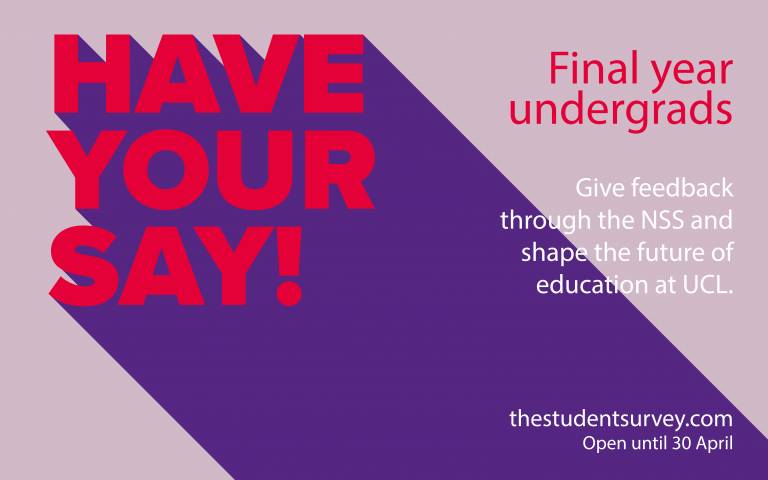Earn extra funds to spend on students through UCL’s NSS incentive scheme
14 March 2022
Find out how five UCL departments have already earned additional funds by reaching a 70% response rate in NSS 2022.

The National Student Survey is an important source of feedback on the undergraduate experience at UCL and on specific programmes. Results and open text comments from the NSS have contributed to improvements across UCL, as you can see on the You Shaped UCL webpage.
A minimum 50% response rate (with at least 10 responses) is required for publication of programme-level NSS results. However, a higher response rate brings in more of the open text comments that are often helpful in illuminating the reasons behind quantitative results and ensures that results are less likely to be influenced by any outliers in student opinion. Final-year undergraduates can complete the survey at www.thestudentsurvey.com until 30 April 2022.
To support academic departments in securing a high NSS response rate, UCL runs an annual incentive scheme in which departments can earn up to £1,500 in additional funds (depending on the size of the NSS-eligible cohort) when they secure a response rate of 70% or more. Departments that qualify for the allocation of additional funds should consult their final-year undergraduates on how to spend the money.
How to increase response rates
Five UCL departments have already qualified for this year’s NSS response rate incentive scheme and they have shared some examples of how they have successfully promoted the survey locally.
All of the qualifying departments have stressed the value of direct communications in promoting the NSS to eligible students. The School of Management and the Department of Electronic and Electrical Engineering both noted the impact of an NSS launch email that explained the purpose of the survey and introduced students to the incentive scheme. The departments also sent out reminder messages and updates on their progress towards the 70% response rate mark. Staff can also find template messages in UCL’s NSS 2022 guidance document.
The Department of Genetics, Evolution and Environment also canvassed students on how they’d like the additional funds to be spent, even before they reached the 70% mark. This helped students engage with the incentive scheme, as they knew how the department would use the funds.
As well as contacting the students directly, departments have also filtered promotion of the NSS through student reps, with reminders at SSCC and Departmental Teaching Committee meetings. The School of Management, meanwhile, briefed Personal Tutors on the NSS and UCL’s incentive so they could mention it in conversations with undergraduate finalists.
Several of the departments that have already qualified for the incentive also organised optional events for students to join, where they could complete the survey. For instance, students on Electronic and Electrical Engineering programmes could attend a departmental pizza and feedback event.
Demonstrating the impact of student feedback through examples of local improvements inspired by previous students’ feedback can drive up participation in surveys such as the NSS. The Genetics, Evolution and Environment did this though a ‘You Said, We Did’ section of their Moodle site, which helped them qualify for the incentive funds. Showing students how their feedback has brought about changes may also boost eventual NSS results, particularly in response to NSS statement 25: “It is clear how students’ feedback on the course has been acted on”.
Staff with any questions about NSS 2022, the response rate incentive scheme or UCL’s campaign at large should contact the Student Engagement and Experience unit (UCL Education and Student Experience) who will be happy to help.
 Close
Close

